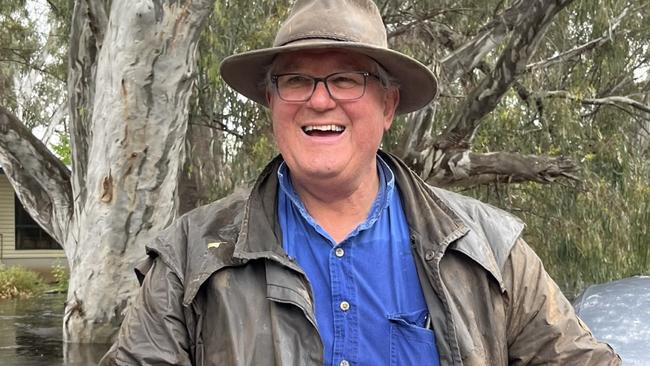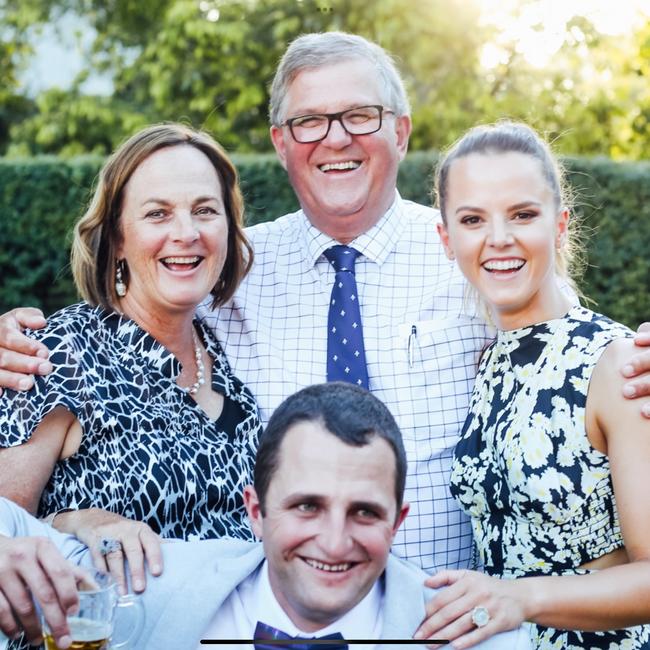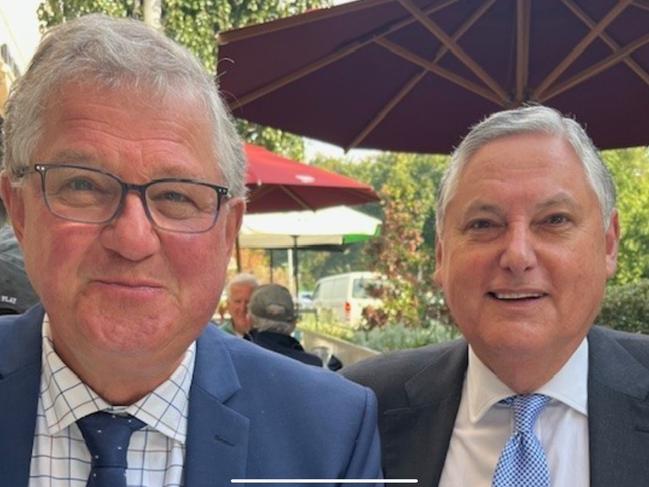Paying homage to respected Aussie farmer and ‘good bloke’ Bruce Simpson
The death earlier this year of Riverina farmer Bruce Simpson was sudden and a shock to the community. Now, his family are looking to keep his legacy going.

On the afternoon of February 13, 2024, a violent storm swept through the Riverina region of southern NSW and ravaged a string of farms, including the property known as “Coolowie”, outside the town of Deniliquin.
Its owner Bruce Simpson, a highly respected figure in regional agriculture, had run the mixed irrigation property and three others adjacent with his wife Shandra and children, Charlie and Lucy, for nearly a quarter of a century.

That evening, as Simpson was clearing debris on the property in the aftermath of the storm, he was attacked by a swarm of European paper wasps. Their stings contain several toxins that can cause hypersensitive or allergic reactions in some people, but rarely are they life threatening.
Yet for Simpson, it was the worst possible outcome.
Unable to fend off the swarm, he suffered a catastrophic anaphylactic reaction to the hundreds of simultaneous stings. He had never been previously aware of having any specific allergy to wasp stings.
Within 20 minutes, he was dead.
His passing shocked the local community and was deeply felt by his family, friends and the many who looked to him as a guiding force in the region.
Nearly 1000 people gathered nine days later on February 22 at The Deniliquin Boat Club on the banks of the Edward River to honour his memory. Those who spoke at the service paid tribute to a life lived with integrity and heart.
“Bruce was excellent company. He had strong views about the farm sector and always lamented the apparent divide between rural Australia and urban/metropolitan Australia. Of greatest concern to him was how little real understanding there is in the parliaments of Australia regarding rural and agricultural issues,” his twin brother, John Simpson, who was one of the speakers that day, says.
“He acted on these views, always taking the time to brief ministers and MPs on the core challenges in rural Australia. Although always courteous to politicians, he often despaired at their apparent ignorance of the productive sectors of the economy. He had no time for the social engineering policies of leftist governments, which appeared to be highly dismissive of the views of farmers and those associated with food and agricultural production.”
John Simpson has long been a man-about-town in Melbourne corporate, political and educational circles. He joined the Monash University Council in 2014 and today is deputy chancellor to university chancellor Megan Clark, having taken the role in 2023.
John spent the majority of his executive career with Shell, working in Australia and Asia, and for four years in the UK. He was appointed to the board of Shell Australia in 2002.
Later in his executive career, Simpson worked in senior roles at National Australia Bank, mostly as strategic adviser to the CEO, and spent a number of years as president of ESSSuper, the Victorian Emergency Services and State Superannuation Fund.
The weekend prior to his brother’s sudden death, John and his wife had hosted Bruce and Shandra at their property near the town of Holbrook in southern NSW. It was the last time they were all together.
A trusted voice
Bruce Simpson always had an affinity with the Riverina.
After growing up in Melbourne and then moving to the region, he first found work on the farms.
Later, after gaining a degree in agricultural science in Wagga, he held positions as crop manager in some of the tougher reaches of the southern Riverina, most notably as irrigation manager and director in F.S. Falkiner & Sons.

The decisive moment in his professional career was a move to Deniliquin in 2000, where he joined a farm consulting business called Peppin Planners, of which he later became a partner and owner.
As an agribusiness consultant, he gave invaluable oversight and advice to local irrigators and the dairy sector. He successfully argued the case for farmers to access government support during the millennium drought.
As chair of the Murray Group of Concerned Communities, he was at the centre of all of the implications relating to the Murray-Darling Basin Plan. He was a director of Murray Irrigation for six years.
John Simpson says Bruce was known for his quiet strength and fair-mindedness, whether as chair of Murray Irrigation, as an agribusiness consultant and mentor or as a member of the panel carrying out the independent assessment of social and economic conditions in the Murray-Darling Basin.
“His thoughtful approach made him a trusted voice on complex issues, from water management to community advocacy,” he says.
“At every step, he championed fairness, always willing to listen, support, and help others find their way forward.”
His brother’s shock passing hit John Simpson hard. Despite taking radically different paths in their lives, they used to speak every week.
“I was always interested in what Bruce was doing, and what has always struck me about Bruce was his determination to make a difference,” John says.
“He wanted to bring people along with him in that pursuit. He also took great interest in building that bridge between metropolitan and rural Australia, and give the city a greater understanding of rural Australia.”
But it wasn’t the first time that tragedy had hit the Simpson family.
Older brother Robert, a doctor, surgeon, medical administrator and public policy leader, died suddenly in 1994. He was chief medical officer of the Victorian Health Department for the four years prior to his passing.
And John’s remaining brother, James, has recently retired as professor of English literature at Harvard University.
In memory of Bruce Simpson, the family has recently launched The Bruce Simpson Rural Scholarship Fund, a partnership with the Australian Rural Leadership Foundation to create a $2m perpetual fund to ensure that Bruce’s commitment to rural Australia lives on.
The fund will provide an annual scholarship to a promising individual from the rural sector to undertake the Australian Rural Leadership Program, a 15-month program for rural leaders that takes place over five sessions across Australia and Asia, and develop critical leadership skills.
John Simpson and Bruce’s children, Charlie and Lucy, have agreed to play central roles in the scholarship selection committee going forward.
‘I was always interested in what Bruce was doing, and what has always struck me about Bruce was his determination to make a difference.’
John Simpson
John says Bruce’s legacy will live on in each scholarship recipient who steps forward to carry on his vision for a resilient, thriving rural Australia where leadership is cultivated and shared for generations to come.
“What drew us to aligning this initiative to the ARLF is that they have the know-how of building future leaders in this country. It is absolutely critical that we do this work to connect all of Australia with the issues affecting rural areas,” he says.
“We want to equip people with the skills, confidence and ability to represent not just themselves, but their communities. Instilling leadership skills is vitally important to bring about change.”
John has long had an interest in education and served on the board of Melbourne’s prestigious Scotch College for 16 years.
And 2025 marks 50 years since he and Bruce graduated from the college as students, and John is expected to be a speaker at a student reunion planned for late next year, where he will talk about The Bruce Simpson Rural Scholarship Fund.
A formal launch of the fund will take place at Deniliquin in coming months.
Bruce Simpson’s network of friends from Scotch College have already made pledges worth over $400,000 to the fund, with about half this amount already donated.
Former Victorian Liberal Party president Ian Carson, who is now executive chair at the John Wylie-backed Tanarra Restructuring Partners, is playing a key role in assisting with the fundraising effort.
Other high net worth individuals, who declined to be named publicly, have also pledged support.
“Bruce always put himself in positions where he kept learning. He knew you never stop learning. For future scholarship recipients, I just hope they grow from their ARLP experience like Bruce grew from his and embrace that learning,” says his widow, Shandra Simpson.
Australian Rural Leadership Foundation CEO Matt Linnegar also knew Bruce Simpson well, having undertaken the ARLF program with him nearly 25 years ago.
“The creation of a self-sustaining fund is of huge importance to Bruce’s family, and to the ARLF. The enormous potential of the fund to support a committed leader – with full scope to match with the best candidate – is exciting,” he says.
“These scholarships afford an invaluable opportunity for diverse people to access a world-class leadership development opportunity.”
John Simpson will never forget the parliamentary eulogy for his twin brother given in the House of Representatives on February 28, 2024 by the Deputy Leader of the Opposition, Sussan Ley.
She lauded Bruce for his achievements while always being inquiring, thoughtful, always well-prepared, with a deep understanding of governance processes.
But John Simpson says she concluded her eloquent praise of his brother with just the right colloquial phrase.
“After listing his many community contributions, she went to the heart of the matter,” he says, before quoting the minister: “More importantly, he was a good bloke.”





To join the conversation, please log in. Don't have an account? Register
Join the conversation, you are commenting as Logout